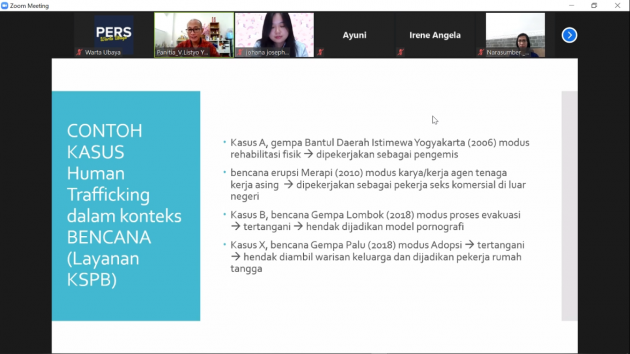
Diskusi Isu Bencana dengan Ubaya Center for Sustainable and Disaster Studies (KSPB)
Pada hari Sabtu, 17 April 2021, Kelompok Studi Psikologi Bencana (KSPB) Universitas Surabaya (Ubaya) menyelenggarakan Webinar dan Talkshow. Dengan judul "Human Trafficking and Disaster", diharapkan dapat memberikan wawasan kepada para peserta mengenai bencana, terutama perdagangan manusia. "Bencana dapat didefinisikan sebagai peristiwa yang mengganggu kehidupan normal dan menyebabkan penderitaan melebihi kemampuan manusia untuk menyesuaikan diri atau menghadapinya," ujar Listyo Yuwanto, M.Psi., Psikolog pada awal presentasi. Menurutnya, ada tiga jenis bencana, yaitu: Bencana Alam, Bencana Sosial, dan Bencana Non-Alam.
Begitu juga hal-hal yang terdampak oleh bencana sangat beragam, mulai dari: Pribadi atau Individu, Komunitas, Sistem Sosial, Materi, Kebijakan, hingga Perdagangan Manusia. "Perdagangan manusia meliputi perdagangan manusia, eksploitasi manusia, perbudakan, perdagangan organ, dan lain-lain yang akan menjadi topik utama dari webinar ini," jelas Listyo. Ia juga menjelaskan berbagai bentuk perdagangan manusia serta contoh kasus perdagangan manusia dalam konteks bencana.
"Sebenarnya, sejak SMA saya tertarik untuk ikut berpartisipasi dalam berbagai kegiatan sosial karena membantu orang lain membuat saya merasa berguna dan bahagia karena bisa membantu orang lain," ungkap Lintang Dwi Maharini, S.Psi. Lintang menambahkan bahwa tahun 2017 adalah tahun pertama dia terlibat langsung dalam penanganan perdagangan manusia sebagai relawan. Lintang juga memiliki berbagai pengalaman, mulai dari berinteraksi secara khusus dengan korban perdagangan seksual atau memberikan bantuan (psikologis, konselor, dan konfrontasi). "Pengalaman konseling yang paling sulit bagi saya adalah meyakinkan seorang anak untuk percaya dan bercerita kepada kami. Sesi tanya jawab menjadi penutup dari webinar dan talkshow ini. Salah satu peserta bertanya, "Apakah mudah merehabilitasi atau membentuk ulang anak-anak yang mengalami perdagangan manusia?" Menanggapi hal ini, Lintang mengatakan bahwa memang sulit untuk dilakukan. "Namun, itu adalah tantangan kami sebagai pendamping. Bagaimana kami meyakinkan mereka atau bagaimana kami membawa mereka kembali ke kehidupan yang baik," tutup Lintang.
